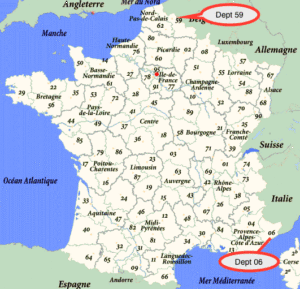I was 10 years working in my office job – real, salaried employment! Jo says, pausing with me on the terrasse before organizing her day here at Bellevue. She shakes her head. But I was let go on la veille de Noël – on Christmas Eve – apparently for economic reasons.
As Jo names the reason for her sudden redundancy, the robust early-30-something swirls her dark eyes. She doesn’t believe her employers’ excuse. That, and maybe the fact that she is fed up with the enduring economic rut that has engulfed the whole of her country.
I had droit aux allocations, she says. Jo was entitled to allowances from the State – and in particular to un indemnité chômage. Unemployment benefits. I settle in with the young woman on Bellevue’s terrasse, my pen poised to capture the mind-boggling tale that I know is coming.
Early January: Jo gathered un dossier complet – all the papers she needed to register for her benefits: her birth certificate, carte d’identité, carte de sécurité sociale, copies of her last 12 paychecks, her CV, and all the paperwork from her former employer. She brought her file to the Pôle Emploi, the Employment and Unemployment agency in Cannes, a half-hour drive from here in Antibes depending (importantly) on traffic.
Early February: Jo hadn’t heard a word about her application. She rang the Pôle Emploi. The problem was evident. You lost mon dossier! Jo said.
Non, the government employee said, nous ne l’avons jamais vu! We never saw it!
The quest had begun. Jo’s voice still registers the exasperation all these months later – and in the second retelling of her story this morning, this time at the insistence of Philippe. He wants me to hear it, too. He joins us at the long table on Bellevue’s terrasse overlooking Antibes’ old town.

J’avais besoin de tout refaire! Jo says. I had to do it all over again! But her approach with the good folks at the Pôle Emploi remained calme, she insists.
C’est comme ça chez nous, Jo says. It’s just like that in France. It’s as if she almost expected a problem. In her habitually paper-intensive culture, she always makes a photocopy.
Mid-February: Jo gathered her paperwork again and drove to Cannes. Sorry, the Pôle Emploi said, passing the dossier back to Jo. We cannot open your file. Your carte d’identité has expired.
Jo checked the card. It had expired three days earlier.
I look at Philippe. He’s my language broker as I try to follow a rapid-fire delivery of this story in the lilting accent of a South-of-France native. My Anglo accent is hardly easier on Jo; she usually raises her eyebrows when I speak to her, as if understanding me requires the utmost concentration. (It probably does . . . more on that in some future post.) Still, I adore having this connection with her. She is exactly the kind of person you dream of putting in charge of your home when you’re away – and even when you’re not. Responsible and hardworking, she’s a self-starter who’s not afraid of giving directions to a bevy of workmen. In the battle with the Pôle Emploi, I knew who would win.

The recent expiry of Jo’s identity card was bad luck. It happens once every 10 years in France – and from now on under new regulations, every 15.
I had to refaire la carte, she says. She needed a new ID card. But to apply for it, Jo continues, I needed my certificat de naissance. By that point, it had expired, too.
Your birth certificate expired?
Oui. That’s how it’s done here, Jo explains. In France you request your certificat de naissance from the mairie. But it only remains valid for three months.
So Jo made her request at the mairie (via internet in this case, thankfully) for a new certificat de naissance (which takes a week’s delivery) . . . so that she could apply for the new carte d’identité (which takes three weeks’ delivery) . . . in order that she could submit a new dossier to the Pôle Emploi with the hopes that (one precious day) she might receive some overdue unemployment money.
I can’t help but admire Jo’s perseverance. Honestly, this quality – one that receives a great deal of attention in North American schools these days – must be ingrained in the French psyche in order for this population to survive.
Mid-March: Jo again gathered her paperwork and returned to the reception counter of the Pôle Emploi in Cannes. The clerk at last agreed to open a file for Jo. She copied directly from the various papers and (newly valid) cards, inputting the details piece by piece into a central government computer.
Late March: Jo received a letter from the Pôle Emploi asking her to provide an attestation from Sécurité sociale in départment 59.

The way France is divided, département 59 is the Nord, a territory in the far north of France that is more used to receiving ferries from England than it is to hearing lilting South-of-France accents. Bizarrely, the Pôle Emploi was asking Jo for her social security registration in a part of the country that’s diametrically opposite from the Côte d’Azur.
Then it clicked. The clerk s’est trompée when she put my numéro de sécurité sociale into the system! Jo says. She pulls a credit card-like piece of plastic out of her wallet and points to two digits in the middle of a long number. The “06” on her carte de sécurité sociale corresponds to the Alpes-Maritimes, the département housing the whole of the French Riviera.
Early April: Back Jo went to the Pôle Emploi in Cannes with her employment papers, her paychecks, her CV, her cartes d’identité and de sécurité sociale, and her certificat de naissance – all, fortunately, still valid. This time she wasn’t so calme. When I ask her, Jo describes her mood that time as énervée. She hesitates in telling me exactly what she told the attendant clerk – but it was too good not to share. Clearly I don’t understand the slang, but the satisfaction in her smirk is obvious.

So maybe you can say this kind of thing because you’re French? I ask. I try to explain. To make headway in a situation, we Anglos are taught to package our frustrations with French bureaucracy into a neat game of us-versus-them. Oooo la la, we might say to an administrator, can you believe all this bureaucracy imposed on us by the government? It’s so wretchedly inefficient but, ouf, I guess we just have to deal with it. Allons-y, let’s tackle the job together! That sort of thing.
Non, Jo says, I don’t play this game. C’est tout le temps comme ça. Il y a trop de papiers. It’s always like this. There are too many papers.
Word games and shattered nerves aside, the clerk at the Pôle Emploi dutifully started again, inputting Jo’s dossier into the ether that is the French unemployment system.

Mid-June: Jo finally received a whiff of better times. Almost six months after she’d begun this whole operation, Jo received precisely one-half of one benefit cheque.
Mid-July: Jo is in the system. Hurrah. She received her first full unemployment cheque. She also received the first half of her retroactive funding. Now she waits again, hoping the second half of her back claims might arrive in October.
So gripped have I been by Jo’s ordeal – so intent on grasping the finer points of the French system – that only now do I recognise our shared frustrations with French bureaucracy. But all along I’ve been nodding in strange comprehension. I know the wasted time and frustration of the paperwork needed to bring Yoko, our poodle, into France this summer. I try to build a bridge.
So did you have to follow all the ridiculous details that I did? I ask Jo. Did you have to complete all the forms in block letters – black ink only, except for your signature, which resolutely had to be in blue? Did you have to use a ruler to cross out all the lines that didn’t apply? Did you have to initial each and every deletion?
Jo delivers the slightest of French shrugs. Of course she did all this. It hadn’t occurred to her to mention these details to me. Nous, nous sommes habituées de faire des papiers, she says. We French are used to filling out paperwork.
She knows the system. And in this modern-day Battle of the Bureaucracy, the formidable Jo finally won.


France is wonderful country to visit but I shudder at thought of having to live there and deal with the day-to-day bureaucracy! Love your blog!
À la prochaine!
Jayne
Merci, Jayne! And me, too! Local friends keep telling me their stories, my fave recently being the tactics used by one to get what she wants: She simply returns to the same place, same counter . . . but waits for a different attendant. Case in point, one day the welcoming attendant at the local Barclays Bank branch was unfamiliar with travelers’ cheques, and thus the bank certainly didn’t provide that service. Same desk but the next morning, a different attendant asked her, “How many do you want?”
When I was a visiting prof at INSEAD in Fontainebleau nearly a half century ago in 1968, the bureaucrats were actually helpful. It may have been the water or sympathy for a young naive Canadian with halting french. Congratulations to Jo for her resoluteness and you for a great story.
And thank you, Jim, for sharing yours. A delight to hear from you. j
I’m sitting here in Vienna chuckling to myself. The incident you relate in your comment above, Jemma, was precisely our experience at HSBC in Nice a few weeks ago. It wasn’t about travelers’ cheques but replacing a CB … one day, “Désolée” and the next, “Pas de problème”! Oh, but we do love France nevertheless! See you in Toronto!
Same here, Patricia . . . just like you, we keep coming back for more! xoj
Your story brings back memories of my own experience with French bureaucracy while applying for ‘un visa de long séjour’ when we spent a sabbatical year in France in 2002. We still joke, after all those years, about never-ending paper work. Only best memories prevail. France is great, indeed 🙂
Hi Jemma
I just got back to Addis Ababa after visiting some amazing places throughout Ethiopia. All government agencies these days have to be worked by the people who pay high taxes who need the service.Take away 50% of the paper work and the people who are entitled to use the services will be able to receive the service more fairly with less effort. People should be able to use government agencies not need to waste time to receive service from the people who are suppose to work for them and help them
Laura